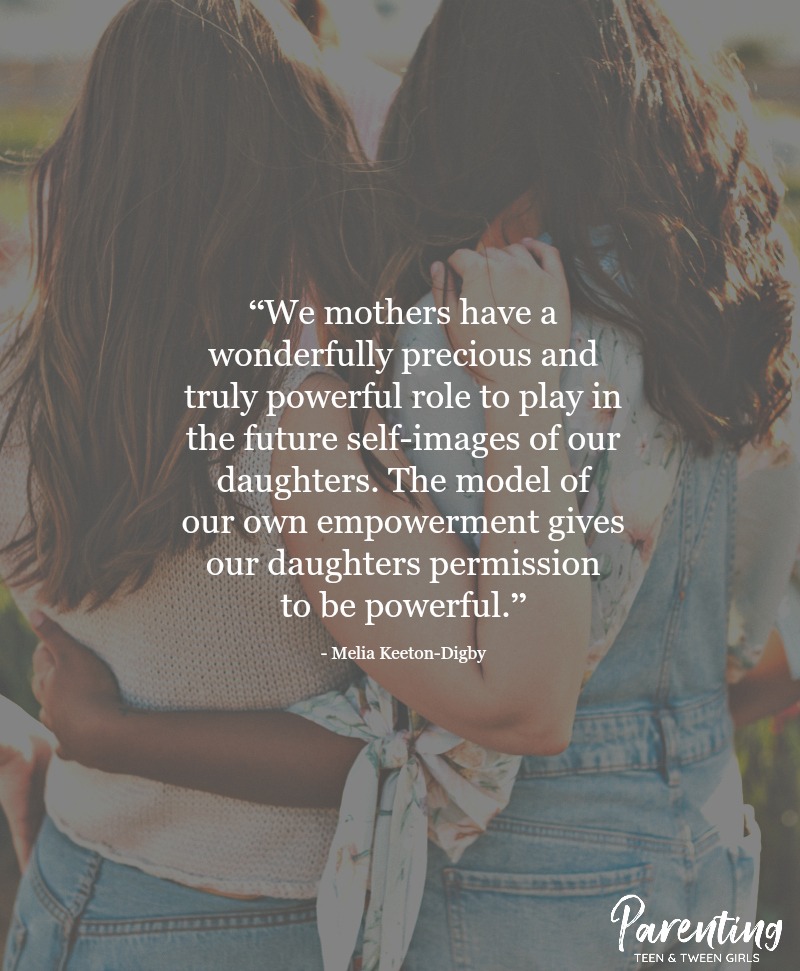
Dear teenage daughter, I know how hard it is to learn to love yourself. And I know how hard it is not to be liked by others.
Recently, my teen daughter told me about a girl on her team who she knew didn’t like her.
She didn’t bully her. She didn’t blatantly say things to hurt her feelings.
But she could feel the disdain. She could feel the tension. Teenage girls (and some boys) have a way of doing that.
So, my people-pleasing daughter kept trying. She struck up conversations that didn’t go anywhere. She tried to do some nice things.
Related: Dear Daughter, Let Me Help Make Sure Life Doesn’t Wear You Down
But this girl was not interested.
It’s odd, because they actually have a lot in common, but no matter how my daughter played it, this other girl was not a fan.
These teenage years can be hard, especially for kids today.
I always say I’m glad I didn’t grow up in the age of social media. It would be hard to see all my friends out at a gathering and wonder why I wasn’t included. I think all the filters on social media would have messed with my body image and destroyed my sense of self-worth. And with all the recording and social media shaming going on in the world today, it would be hard to have every mistake I made in high school be documented for the world to see.
And with all the uncertainty in the world right now, it’s no wonder why mental health issues such as anxiety, depression, self-harm, and suicidal ideation are at an all-time high.
But one thing hasn’t changed. The adolescent brain is just always so messed up! There are the hormones surging and growth spurts and mood swings. There is a new focus on physical appearances and impulses and sudden changes with our bodies. There are new insecurities and behaviors and selfishness that maybe wasn’t there before.
And the drama. Oh, so much drama with friends and significant others and teachers and coaches. It’s a time for a lot of life lessons.
As we age, we often learn how to better manage the behaviors of others. We try to set boundaries, be a little more understanding, and manage our own insecurity.
But even for this mom who is well past her teen years, sometimes it’s hard to accept not being liked.
You know what it feels like, when no matter what you do the other person just despises you, and it is crystal clear.
I have some experience with this phenomenon. I know it’s shocking, but there are people that don’t like me (said with huge sarcasm.) They find me pushy or stuffy or awkward or too much.
Some of these people I’m related to, and it’s hard. Some of them don’t even know me, and that’s hard, too.
I can tell how they feel by their behaviors, their actions, and sometimes their clear-cut words.
I know we often provide a litany of excuses for why this happens in order to make us feel better. It’s because the other person is jealous or insecure or miserable.
But none of those things actually ever made me feel better. It was hard for me to know that there was animosity between myself and someone else, and I was pretty much powerless to do anything about it.
The more I tried, the less these people liked me.
And that’s what it really is about, right? The lack of control we have over a situation; the feeling of defeat.

If you are like me (and I hope you are not), you may have agonized over why this person did not like you, analyzed every interaction. hypothesized how conversations would go. I would talk endlessly about these situations with my husband or friends. I would come to terms with it in one moment and then break down about it the next day.
I let it consume me.
Learning to love yourself means accepting that others may not like you–and that’s okay.
One day, when I was mindlessly cleaning out my refrigerator, I came across a jar of olives in the back that we had for a holiday party many moons back, As I went to empty the jar into the garbage disposal, I realized that sometimes I’m just like an olive to some people.
I hate olives.
It doesn’t matter what color they are or how you dress them up or what you throw them into, I can’t stand them. I can’t even eat a slice of pizza that an olive rested upon because I can still taste the olive remnants.
If you’re someone’s olive, you just have to accept it and move on, because you are never going to make someone love olives. But here’s the thing…some people LOVE olives. They’ll eat all the olives and even drink the juice.
Related: The Best Quotes For Mothers of Teenage Daughters
And usually, when someone loves olives, they LOVE olives. They love every salty, briny, slimy bit of those olives, and that’s the way love should be for people too. Thank goodness some people love olives.
Or, you can be like a slice of boring Wonder bread that everyone will tolerate when they have to, but no one yells out, “Oh my God this is the best bread ever! I love Wonder bread!”
It’s okay if someone doesn’t like olives because there are plenty of people that do–and that’s where our focus should be.
But, here’s the thing about coming to terms with it. The most important question to ask yourself isn’t why does someone not like you, but instead, do I like myself?
Do you believe you’re a good person? Do you try to be better than the day before, learn from your mistakes, be kind when you can? Do you support your people and love them well, every salty, briny, slimy bit of them?
When you can say yes to these things, then you can just realize it’s personal preference and life choices.
I hate animosity and try to resolve it at all costs. I can put something to bed when I realize I’ve done my part to make it better, but sometimes someone just doesn’t have a taste for you.
We need to remember that it’s great to be liked, but don’t let the desire to be liked consume you. That’s where you get into trouble.
How do we help adolescents combat the overwhelming desire to be liked?
Well, take it from this middle-aged mom, it’s not easy.
We have to help our teens shift their perspective from focusing from being liked to growing their own self-esteem. A big part of this is shifting their mindset. This can include:
- Teaching gratitude: being grateful for the small stuff often makes a teenager understand what really is important in this world.
- Practicing self-acceptance: Life is full of disappointments, disagreements, and discouragement. When we seek validation from an external source and don’t receive it, we can go into a spiral. Inner peace may seem unattainable to a teenager, but once you learn to feel content with who you are, your need for acceptance from other sources decreases.
- Reserve your judgment of others. Simply put, a person who makes harsh judgments of other people is more likely to be insecure about how those people view them in return. The way you speak about others will become your inner mologue. That doesn’t mean you have to like or enjoy everyone you meet, being overly critical and negative of others can make you like yourself less as well.
- Less scrolling/stay busy. While smart phones and devices are now integral parts of our lives, especially for teens who need them for homework and other basic needs, too much idle time can wreak havok on our self-esteem, decrease our motivation, and have a significant impact on mental health. Teens who volunteer, participate in some social activities, have a hobby they love, hold down a part-time job, etc. often end up worrying less what other people think.
So, what did I tell my own daughter about the girl on her team? “Do what you need to do in a relationship to feel at peace with yourself, but always remember, you can’t make someone love an olive.”
And trust me, I’ve tried.
Parenting teen and tween daughters can be hard, but these other popular posts that parents have found helpful might just make it a little easier.
Words Can Crush Our Teen Girls For A Lifetime, Here’s How To Help
To My Teenage Daughters Before You Start Dating
Here Is How To Help If Your Tween Daughter Is Always In Tears
When you are in the thick of raising teens and tweens, we recommend Loving Hard When They’re Hard to Love by Whitney Fleming. In Loving Hard When They’re Hard to Love, blogger Whitney Fleming shares her favorite essays about raising three teenagers in today’s chaotic world. Written from the perspective of a fellow parent, each story will leave you with tears in your eyes and hope in your heart because someone else is saying exactly what’s been going through your mind.







How can I get a copy of this letter without all the advertisements? I would like to print it off for my daughters.
Thanks in advance,
Andrea
I’m sorry, but as it is part of the website there really isn’t a way to provide a blank copy. My apologies.
Hi, you can copy and paste it onto a word document and then print it out, of course with permission and credit of the author.
Informative and useful article
Thank you! ❤️
A great article – thank you! What would you suggest if, when we ask our daughters if they like themselves, they say no? I’ve had similar conversations recently with my pre-teen, who’s had difficulties with friendships since a very early age (she’s got ADHD and anxiety, which doesn’t help). When I suggest that what’s important isn’t if the other kids like her, it’s if she likes herself, she says, “That’s the problem – I don’t like myself!” Any tips for those next steps in the conversation, please?
I’d love to brainstorm answers to this question, too! My daughter (age 10) says the same type of thing.